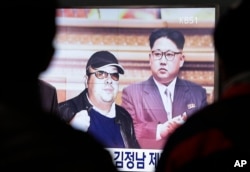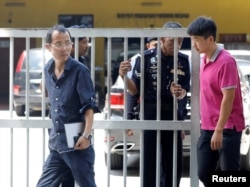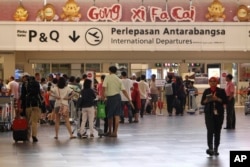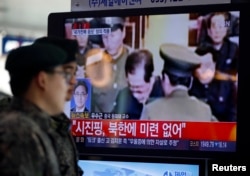Police in Malaysia said Thursday they have arrested a third person in connection with the apparent assassination of a half-brother of North Korean leader Kim Jong Un.
Authorities said those arrested included a 25-year-old woman identified as Siti Aishah, who held an Indonesian passport and was “positively identified” from airport security camera footage. Police also detained a man who provided information that led to her arrest.
On Wednesday, police said they had detained another woman at Kuala Lumpur International Airport in the Malaysian capital. A police statement identified her as Doan Thi Huong, with Vietnamese travel documents, and said she was also positively identified from security cameras.
South Korea on Wednesday confirmed the victim was the North Korean leader’s older half-brother, Kim Jong Nam, who was once in line to become head of state, but fell out of favor with their father, Kim Jong Il, after he tried to enter Japan on a forged passport to visit Tokyo Disneyland in 2001.
“It seems assured that the person who was killed was Kim Jong Nam,” said Jeong Joon-hee, the South Korean Unification Ministry spokesman.
Investigation
A Malaysian police report issued on Tuesday night confirmed a 46-year-old North Korean man, who was traveling with a passport under the name of Kim Chol, died en route to a hospital after seeking medical help in the Kuala Lumpur International Airport. His travel destination on Tuesday was Macau, where he had been living, said the Malaysian police.
On Tuesday unnamed U.S. government sources said the United States strongly believes that Kim Jong Nam was murdered by North Korean agents.
The South Korean National Intelligence Service (NIS) on Wednesday confirmed that Kim Jong Nam was poisoned by two suspected North Korean female agents and that he was poisoned with an unidentified toxic liquid, administered by needles or a cloth.
Malaysian police investigating the attack said the cause of Kim’s death was not yet known.
His body was taken Wednesday morning to a second hospital, where an autopsy was performed. The results of the post-mortem examination have not been released. North Korean embassy officials were also at the hospital and were coordinating with local authorities, police sources said.
Motives
There is widespread speculation that Kim Jong Nam’s death was ordered by high ranking officials in Pyongyang, and very likely by Kim Jong Un.
“If it is proved that Kim Jong Nam's death was committed by the North Korean government, it will be a case that shows the brutality and inhumanity of the Kim Jong Un regime,” said South Korean acting President and Prime Minister Hwang Kyo-ahn.
Kim Jong Nam was reportedly considered a threat to his brother’s rule because of his outspoken criticism of the continued repressive and authoritarian practices within the country, because he was a proponent of reform polices that would loosen state controls, and because there was speculation that Chinese President Xi Jinping would prefer to see him replace his younger brother as the leader of North Korea.
South Korea’s spy agency said Wednesday that Kim Jong Un had issued a "standing order" for his half-brother's assassination, and that there had been a failed attempt in 2012. Kim Jong Nam had been living under Beijing's protection with his second wife in the Chinese territory of Macau.
North Korean defector and analyst Ahn Chan-il, with the World Institute for North Korean Studies, said it is likely that North Korean spies, embedded within the large number of laborers that work in Malaysia’s mineral and mining industry, had learned of the older Kim’s travel plans and decided to target him while he was outside of China’s protection.
“[I think] North Korea may have put spies within these laborers. And while the two women are suspected to be members of [the North’s] reconnaissance bureau, it is highly possible that more than 10 people belonged to other bureaus that may be involved in this case,” said Ahn Chan-il.
The South Korean government on Wednesday also urged all North Korean defectors to take extra precautions for their own safety and security.
Reign of Terror
If proven, the sanctioned assassination of Kim Jong Un’s brother could further isolate a leadership in Pyongyang that is already struggling under harsh sanctions for its continued development of nuclear weapons and for widespread human rights violations.
South Korea's Institute for National Security in December 2016 claimed that Kim Jong Un has ordered the execution of 340 people since he came to power in December 2011. In 2013, he sentenced to death his uncle, Jang Song Thaek, once considered his mentor and the country's second-most-powerful man, for what the North alleged was treason.
Carl Thayer, a defense analyst at the University of New South Wales, said Kim Jong Nam’s death was a further indicator of political anxieties in North Korea.
“And even though his older brother was pushed outside and it was clear he was never going to come back to challenge him, it may be just another indication of Kim Jong Un’s perceived anxieties,” he said.
For the next several days, North Korea will be marking the birthday of its late leader Kim Jong Il, the brothers' father, though they have different mothers. The major holiday this Thursday is called the “Day of the Shining Star'' and will feature figure skating and synchronized swimming exhibitions, fireworks and mass rallies.
Watching closely
China’s Foreign Ministry on Wednesday said it is closely watching developments in the case, noting that Malaysian authorities were still investigating Kim's death.
Chinese academics and state media were also slow to draw any conclusions about Kim's death before the completion of the investigation. They also played down the half-brother's reported links to the country.
Wang Dong, a political scientist at Peking University, said Kim's death was unlikely to change anything, noting that all of the challenges related to the Korean peninsula would not just go away.
“What happened to Kim Yong Nam yesterday was just a piece of titbits or tabloid news. I don't think it will make a fundamental change or have a table-turning impact on the overall [political] situation [in Pyongyang],” Wang said.
Online, however, the discussion was more wide-ranging. Kim Jong Un has increasingly become a target of ridicule on the Chinese internet in recent years as relations between the isolated country’s leader and Beijing have become increasingly frayed. Chinese President Xi Jinping has yet to meet Kim Jong Un since he rose to power, nor has Kim visited China's capital, as his father did in the past.
"Everyone is really just guessing about who killed Kim Jong Nam and those who support North Korea are trying to whitewash what has happened, but neither side has any evidence," read one online comment on an article about who might have been responsible for Kim's death. "Still, North Korea does have a history of assassinating and hunting down so-called traitors overseas."
Another online post was more certain.
"I think that it was definitely the work of Kim Jong Un, ever since he came to power he has been killing all of his relatives. Why would he not go after the biggest apparent heir," the post said.
North Asia analyst, Justin Hastings, an associate professor at Australia’s Sydney University, said China had indicated to North Korea that Kim Jong Nam was not to be harmed while he remained on Chinese territory, including Macau. He said the half-brother’s visit to Malaysia provided an opportunity to kill him.
“It’s not surprising he was killed. Kim Jong Un was going to come for him eventually. What of the timing? It may have simply been because this was when they were able to do it,” Hastings told VOA.
Youmi Kim, Bill Ide, Joyce Huang, Ron Corben and the VOA Korean Service contributed to this report.









